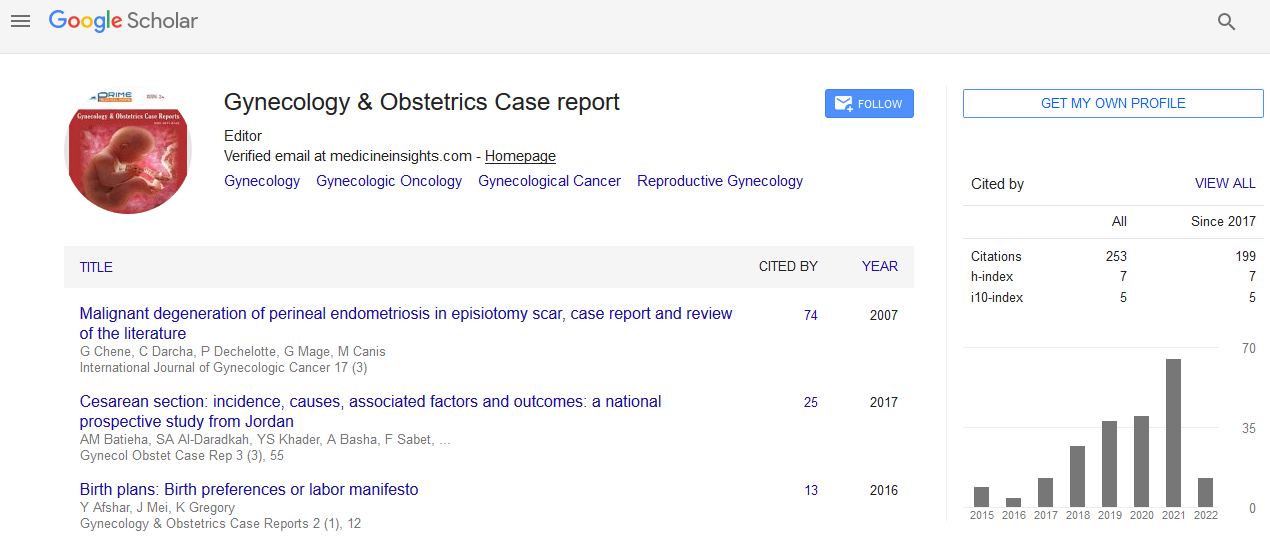Perspective - (2022) Volume 8, Issue 2
Aripiprazole with Pregnancy: A Perspective Study
Natalia Berry*
Columbia University Mailman School of Public Health, New Zealand
*Correspondence:
Natalia Berry, Columbia University Mailman School of Public Health,
New Zealand,
Email:
Received: 01-Feb-2022, Manuscript No. ipgocr-22-12558;
Editor assigned: 03-Feb-2022, Pre QC No. IPGOCR-22-12558 (PQ);
Reviewed: 15-Feb-2022, QC No. IPGOCR-22-12558;
Revised: 21-Feb-2022, Manuscript No. IPGOCR-22-12558 (R);
Published:
27-Feb-2022, DOI: 10.21767/2471-8165.100009
Perspective
Aripiprazole is a second-generation antipsychotic medicine
with a low metabolic and sedation risk profile, making it a
valuable complement to the treatment of severe mental
disorder. Pregnancy is associated with an increased risk of
metabolic disorders such as gestational diabetes, and the
postpartum period is frequently a time when drowsiness might
jeopardise baby care. There is currently limited data on the
safety of aripiprazole use during pregnancy. While the existing
evidence does not indicate an increased risk of deformity
during pregnancy, there is less information on pregnancy and
neonatal problems [1].
The treatment of serious mental illness in pregnancy, such
as Schizophrenia and Bipolar Disorder, is a difficult area of
psychiatric practise since it requires consideration of both
maternal and foetal well-being while deciding on treatment
options. Because of the normal course of these diseases during
pregnancy, the perinatal period is associated with a significant
risk of relapse; many women find that stopping medication is
not an option if they want to retain their health and welfare.
However, pregnancy-related physiological changes and
metabolic vulnerabilities, as well as the inevitability of foetal
pharmaceutical exposure, make therapy selection difficult [2].
Second-generation Antipsychotics (SGAs) are now widely used
as first-line treatments for severe mental illness, especially
psychotic disorders, in modern mental health practise. Older
SGAs, such as risperidone, olanzapine, and quetiapine,
now have some evidence for their risks and benefits during
pregnancy, and are frequently used to treat women during
the perinatal period. When employed in the perinatal
era, however, each has demonstrated to have limits. For
example, olanzapine and quetiapine might cause Gestational
Diabetes (GDM), weight gain, and severe drowsiness, making
postpartum care for their newborn difficult. Following first
trimester exposure to risperidone, a modest increased risk
of abnormalities, particularly heart malformation, has been
reported. As a result, the present alternatives for women who
want to avoid significant weight gain and drowsiness while also
being concerned about the possibility of deformity are limited.
In general adult mental health, aripiprazole, a partial agonist
of certain dopamine and serotonin receptors, is increasingly
being recommended. This is especially true in clinical scenarios
where there has been no tolerance or response to other SGAs,
where there is a desire to avoid sedating medications, or where
metabolic risk is a major worry. Aripiprazole, unlike many other
SGAs, does not raise metabolic risk, weight gain, or sedation
[3].
Furthermore, if a woman is considering a pregnancy or
becomes pregnant while taking aripiprazole, the question is
why she should stay on the medicine if she is stable. Despite
the fact that aripiprazole has been on the market since 2002,
there is little research on the dangers and benefits of using
medication during pregnancy. The amount of the data comes
from population-based research looking at malformation
risk, as well as case studies and tiny case series. Confirmation
of exposure period and dose, mental health indications,
information on confounding factors in pregnancy such as body
mass index, smoking and alcohol use, and other concomitant
exposures are frequently missing from this research [4,5].
Indeed, the majority of individuals in one of the largest studies
to date from a French teratogen service had no information
on important pregnancy problems and neonatal outcomes,
and only a third had information on alcohol exposure.
Furthermore, only 21% of the women in the study consumed
aripiprazole while pregnant, and the majority of them were
using numerous psychoactive drugs. As a result, the goal
of this study is to present a case series of women who took
aripiprazole during pregnancy and had detailed records of their
diagnosis, exposures, and pregnancy outcomes in order to aid
in the collection of data on this treatment.
REFERENCES
- Bellet F, Beyens MN, Bernard N, Beghin D, Elefant E, et al. (2015) Exposure to aripiprazole during embryogenesis: a prospective multicenter cohort study. Pharmacoepidemiol Drug Saf. 24(4): 368-380.
[Google Scholar], [Crossref], [Indexed at]
- Bodén R, Lundgren M, Brandt L, Reutfors J, Kieler H (2012) Antipsychotics during pregnancy: relation to fetal and maternal metabolic effects. Arch Gen Psychiatry. 69(7): 715-721.
[Google Scholar], [Crossref], [Indexed at]
- Dobbins TA, Sullivan EA, Roberts CL, Simpson JM (2012) Australian national birthweight percentiles by sex and gestational age, 1998–2007. Med J Aust. 197(5): 291-294.
[Google Scholar], [Crossref], [Indexed at]
- Galbally M, Snellen M, Power J (2014) Antipsychotic drugs in pregnancy: a review of their maternal and fetal effects. Ther Adv Drug Saf. 5(2): 100-109.
[Google Scholar], [Crossref], [Indexed at]
- McCauley‐Elsom K, Gurvich C, Elsom SJ, Kulkarni J (2010) Antipsychotics in pregnancy. J Psychiatr Ment Health Nurs 17(2): 97-104.
[Google Scholar], [Crossref], [Indexed at]
Citation: Berry N (2022) Aripiprazole with Pregnancy: A Perspective Study. Gynecol Obstet Case Rep. Vol.8 No.2:9. DOI: 10.21767/2471-8165.100009.
Copyright: © 2022 Berry N. This is an open-access article distributed under the terms of the Creative Commons Attribution License, which permits unrestricted use, distribution, and reproduction in any medium, provided the original author and source are credited.

